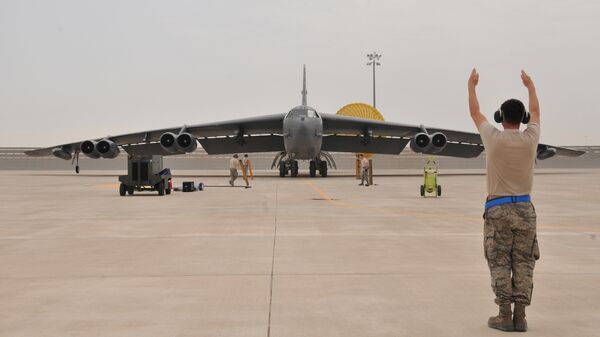Tehran has confirmed that it conducted missile attacks on US targets calling them "proportionate measures in self-defence under Article 51 of the UN Charter" in response to a previous drone strike against Iranian "citizens and senior officials" in a clear reference to the assassination of Quds Commander Qasem Soleimani on 3 January near Baghdad International Airport.
Iran took & concluded proportionate measures in self-defense under Article 51 of UN Charter targeting base from which cowardly armed attack against our citizens & senior officials were launched.
— Javad Zarif (@JZarif) January 8, 2020
We do not seek escalation or war, but will defend ourselves against any aggression.
"We do not seek escalation or war, but will defend ourselves against any aggression", Iranian Foreign Minister Javad Zarif tweeted in the aftermath of the shelling.
Scenario 1: US Accepts De-Escalation
"The retaliatory strike, at least this first one, by Iran against Iraqi military bases where the US military forces are present is a minimum response", says Mark Sleboda, a US military veteran and international affairs and security analyst. "This was a symbolic strike. It was an escalation to de-escalate. These missiles were not supposed to cause any casualties. We haven't got a damage assessment yet but they were probably not even meant to cause significant damage".
The military veteran highlights that Washington said that there were no American casualties and throws into doubt Iran's preliminary assessment that the strikes killed 80 US troops. He adds that there has not been an Iraqi confirmation of any casualties so far. On 8 January, Iraqi Prime Minister Adel Abdhul-Mahdi revealed that Baghdad had been warned beforehand about the missile attack on Iraqi soil.
According to Sleboda, "this is about the Iranian government saving face right now".
The security analyst draws attention to the fact that while the missiles were launched by Iran US fighter jets were activated out of Qatar and Iranian fighters were also put into the air but after the Pentagon's confirmation that there had been no significant casualties due to the strikes, the planes returned to their bases.
"It seems for the moment at least, the US is accepting the de-escalation by the Iranian side", he observes. "This does not mean that Iran will not strike again in the future at a time and place of their choosing, perhaps by more stealthy means, i.e. cyber warfare, a quid-pro-quo assassination of a political or military figure, or indirect attacks via their allies. But right now they don't want to pursue to direct warfare".
They were slapped last night, but such military actions are not enough. #AlAssadBase
— Khamenei.ir (@khamenei_ir) January 8, 2020
Scenario 2: US Bombardment & Missile Strikes Against Iran
In the aftermath of the Iranian ballistic missile strike on US positions in Iraq, President Donald Trump signalled that he would deliver a speech after the assessment of damages and casualties.
Sleboda presumed that there could be conflict within the US administration, apparently driven by "hawkish figures", neocons, and protégés of former National Security Adviser John Bolton in the White House including Secretary of State Mike Pompeo who may have been pushing for a greater conflict with Iran.
In contrast, the Pentagon seems to be trying to de-escalate the situation, the security analyst says, citing recent media reports.
"We don't know what the final result will be, this is the first time that a country has directly attacked back at the United States in decades at the least", he highlights. "A lot remains to be seen, how the US assesses the damage and what type of inner political battles is going on inside the White House and between the White House and the Pentagon right now".
If the hawkish forces prevail in Washington and the US decides on war, its attacks will most likely be limited to extensive bombing and cruise missile attacks, Sleboda elaborates, adding that though it may cause significant damage the Iranian government is likely to survive that.
Scenario 3: US Ground Invasion of Iran
"The far ranged solution that would actually mean regime change in Tehran would mean a ground invasion of Iran", according to the US military veteran. "That would require somewhere between 500,000 and 1 million US and allied forces", he stresses. "That significant [invasion] would require a military draft to be instituted in the US and would take at least three to six months to prepare and everyone would see it happen. That does not seem to be on the table at the moment but anything is possible".
If the US goes to war there are no chances that any external forces and global players will be able to successfully de-escalate the situation, he highlights.
"The UK and Germany have already basically announced full support for the US over the assassination of Soleimani and have also condemned the Iranian ineffectual retaliation so far. And, of course, Saudi Arabia and Israel will back the US as will the rest of the Gulf. Countries that host US military bases – Qatar, Bahrain, etc. – they will be essential for any war effort against Iran", Sleboda foresees.
The security analyst suggests that on the Iranian side, their allies will be some forces within Iraq, most likely the Popular Mobilisation Units; Hezbollah in Lebanon; probably Hamas in Gaza; the Houthis in Yemen; several other smaller Shiite militias around the Middle East and North Africa.
"Russia and China will provide rhetorical and political support for Iran but will almost certainly not become directly involved in any conflict. If it becomes serious Russia may increase the amount of military-technical cooperation and supplies to Iran. But don't expect any Russian or Chinese to come fighting to Tehran's defence. There is no WWIII scenario here", he emphasises.




